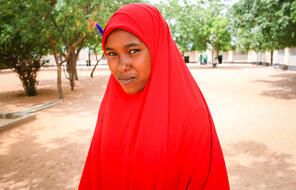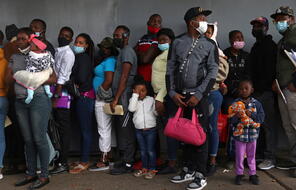Warsan Shire's Poetry About Home
Subject
- Social Studies
Language
English — USUpdated
About the Poet
Warsan Shire was born in Kenya to Somali parents and lives in London. She is a poet, writer, editor, and teacher. In 2013-2014, she was the Young Poet Laureate for London.
Warsan Shire’s “Home”
Shire wrote “Conversations about home (at a deportation centre)” in 2009, a piece inspired by a visit she made to the abandoned Somali Embassy in Rome which some young refugees had turned into their home. In an interview, she told the reporter that “The night before she visited, a young Somali had jumped to his death off the roof.”
The encounter, she says, opened her eyes to the harsh reality of living as an undocumented refugee in Europe: “I wrote the poem for them, for my family and for anyone who has experienced or lived around grief and trauma in that way.” This poem became the basis for “Home.” “Home” has been shared widely across the media and has been read in a range of public spaces, including London’s Trafalgar Square. Commentators have noted that “Home” has touched a nerve among people, that it has offered a way to give voice to refugees and to provide some authentic understanding of the crisis.
Note: The poem “Home” contains dehumanizing language. Dehumanizing language should not be spoken or read aloud during class. We believe that the best way to prepare to encounter the language and topics in this poem is to create class contract outlining guidelines for a respectful, reflective classroom discussion. Teachers should plan how they approach the n-word when reading and discussing Shire’s poem. Finally, “Home” alludes to the sexual violence that some refugees face on their journeys. It is important that teachers preview the materials, know their students, and build in time and space for individual reflection in journals so that students can respond emotionally to what they are reading and learning.
Formative Influences on Warsan Shire’s Poetry
In an interview after she won the Brunel University African Poetry Prize, Warsan Shire was asked to talk about her sense of commitment to substance and urgent subject matter in her work. In response, Shire said:
I’m from Somalia where there has been a war going on for my entire life. I grew up with a lot of horror in the backdrop – a lot of terrible things that have happened to people who are really close to me, and to my country, and to my parents; so it’s in the home and it’s even in you, it’s on your skin and it’s in your memories and your childhood. And my relatives and my friends and my mother’s friends have experienced things that you can’t imagine, and they’ve put on this jacket of resiliency and a dark humour. But you don’t know what they’ve been victims of, or what they’ve done to other people. Them being able to tell me, and then me writing it, it’s cathartic, being able to share their stories, even if it is something really terrible, something really tragic. Sometimes I’m telling other people’s stories to remove stigma and taboo, so that they don’t have to feel ashamed; sometimes you use yourself as an example. 1
- 1Katie Reid, “Q&A: Poet, writer and educator Warsan Shire,” African Words blog, June 21, 2013, accessed September 13, 2016.
How to Cite This Reading
Facing History & Ourselves, “Warsan Shire's Poetry About Home”, last updated November 20, 2023.












